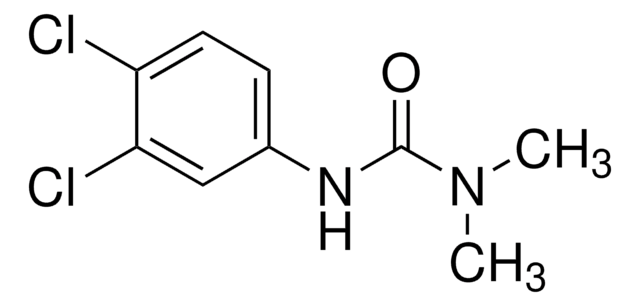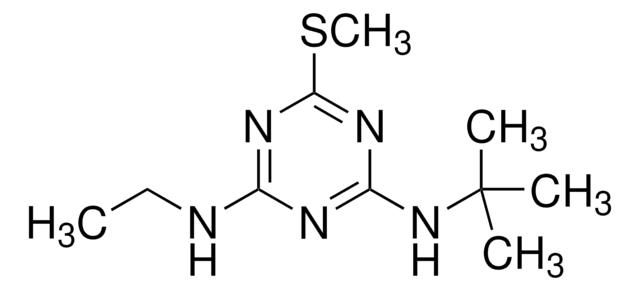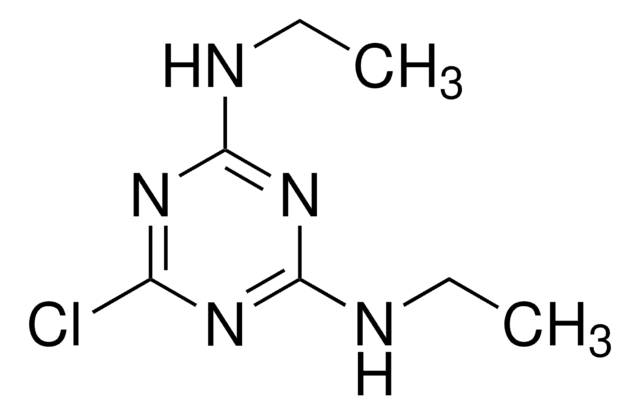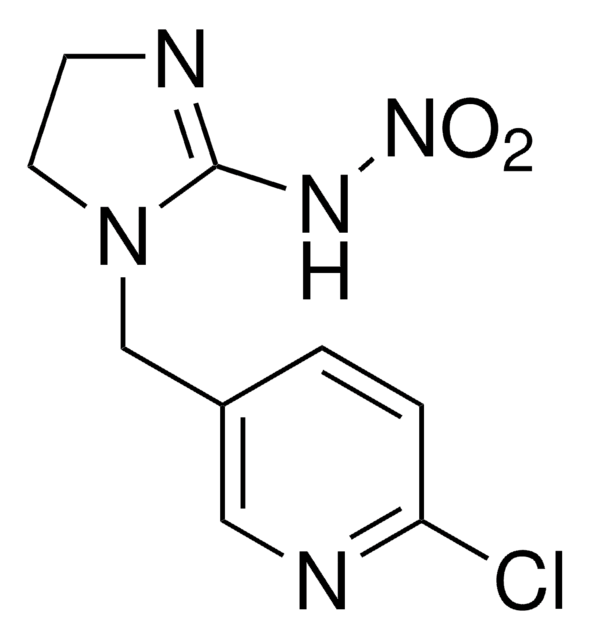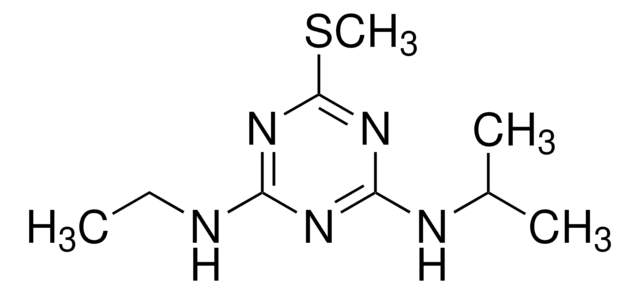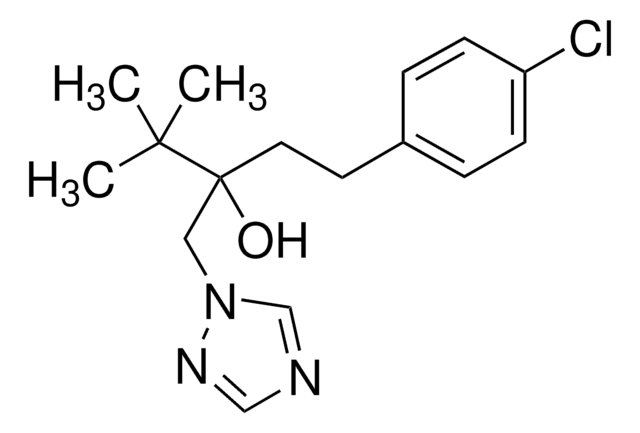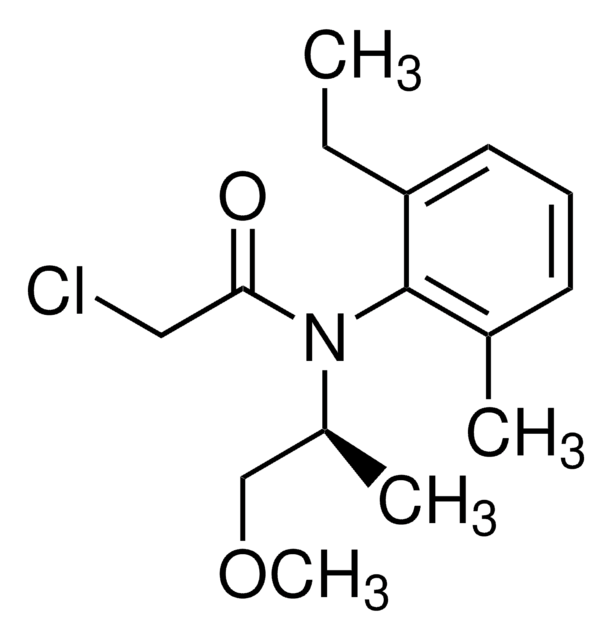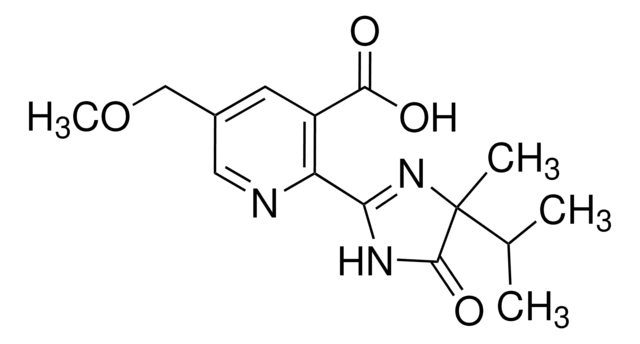About This Item
Recommended Products
grade
analytical standard
product line
PESTANAL®
shelf life
limited shelf life, expiry date on the label
technique(s)
solid phase extraction (SPE): suitable
application(s)
agriculture
environmental
format
neat
SMILES string
CCNc1nc(Cl)nc(NC(C)(C)C)n1
InChI
1S/C9H16ClN5/c1-5-11-7-12-6(10)13-8(14-7)15-9(2,3)4/h5H2,1-4H3,(H2,11,12,13,14,15)
InChI key
FZXISNSWEXTPMF-UHFFFAOYSA-N
Looking for similar products? Visit Product Comparison Guide
Related Categories
General description
Application
- Pesticide distribution and atmospheric persistence: An extensive study reveals the widespread distribution of pesticides, including Terbuthylazine, in the European atmosphere, challenging assumptions about their degradability. This highlights the need for enhanced regulatory measures and monitoring strategies to mitigate environmental and health risks associated with persistent atmospheric contaminants (Mayer et al., 2024).
- Herbicide impact on non-target plant species: Research evaluates the early responses of Solanum nigrum L. to herbicide treatments involving Terbuthylazine, investigating changes in antioxidant activity, osmolyte concentrations, and chlorophyll fluorescence. This study contributes to understanding the selective action of Terbuthylazine and its broader ecological impacts, providing insights for developing more targeted and sustainable herbicidal applications (Hassannejad et al., 2023).
- Human health risk from groundwater herbicide contamination: A human health risk assessment approach is applied to study the occurrence of herbicides, including Terbuthylazine, in the groundwater of Northern Greece. The findings emphasize the importance of continuous environmental monitoring and the development of mitigation strategies to ensure water safety and public health (Parlakidis et al., 2022).
- Seasonal distribution of pesticide residues in water bodies: A study on the seasonal distribution of multiclass pesticide residues in surface waters of northwest Croatia includes Terbuthylazine, discussing the implications for aquatic ecosystems and the effectiveness of current water treatment practices. This research is crucial for assessing the environmental persistence and ecological risks of such chemicals (Fingler et al., 2021).
- Direct pesticide exposure in conservation areas: An investigation into direct pesticide exposure, including Terbuthylazine, in nature conservation areas in Germany, underscores the challenges of protecting vulnerable ecosystems from agricultural chemical intrusion. The study highlights the critical need for stringent environmental protections and pesticide use regulations to preserve biodiversity (Brühl et al., 2021).
Legal Information
Signal Word
Warning
Hazard Statements
Precautionary Statements
Hazard Classifications
Acute Tox. 4 Oral - Aquatic Acute 1 - Aquatic Chronic 1 - STOT RE 2
Storage Class Code
11 - Combustible Solids
WGK
WGK 2
Flash Point(F)
212.0 °F - closed cup
Flash Point(C)
100 °C - closed cup
Personal Protective Equipment
Certificates of Analysis (COA)
Search for Certificates of Analysis (COA) by entering the products Lot/Batch Number. Lot and Batch Numbers can be found on a product’s label following the words ‘Lot’ or ‘Batch’.
Already Own This Product?
Find documentation for the products that you have recently purchased in the Document Library.
Customers Also Viewed
Our team of scientists has experience in all areas of research including Life Science, Material Science, Chemical Synthesis, Chromatography, Analytical and many others.
Contact Technical Service


